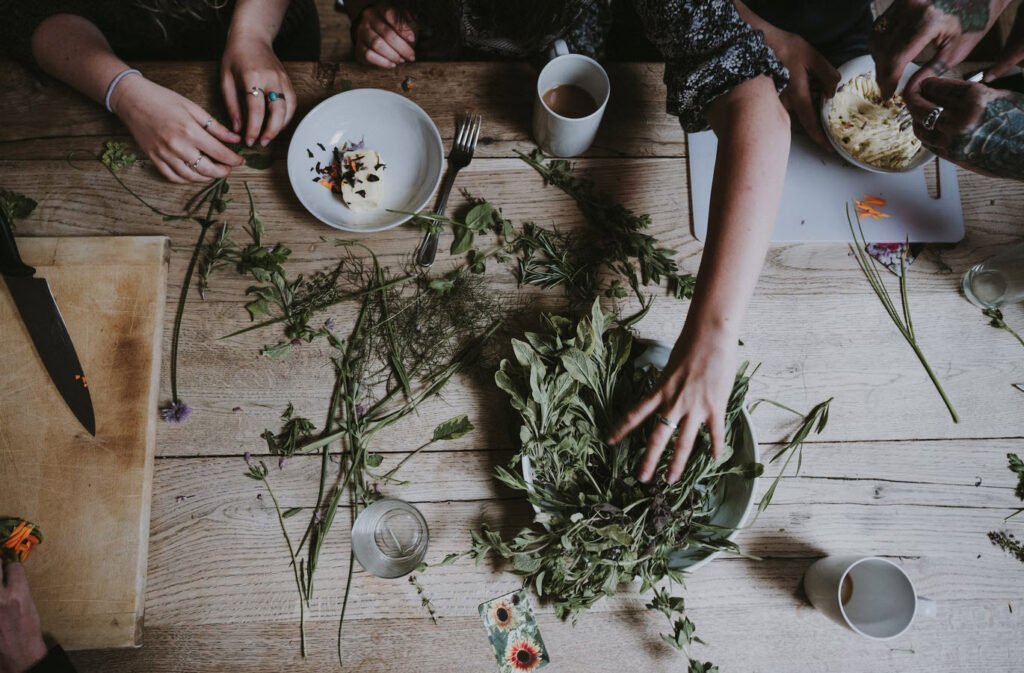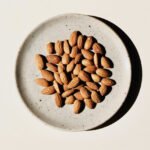Every meal presents an opportunity to nourish yourself and powerfully support your health. Adding more herbs and spices into your diet comes with many benefits. They provide essential nutrients, support natural energy, promote healthy aging, prevent diseases, aid in the repair of vital processes, and strengthen healthy bodily functions. Furthermore, when used correctly, this form of herbal medicine is safe — and way more fun than popping an herbal capsule or taking an herbal tincture.
You may be wondering how something in your kitchen cabinet can have such a dramatic effect in so many areas of health. Part II of this book will go over the specific gifts of each plant, but before we look at the details, let’s examine the general ways in which herbs deliver those qualities.
Herbs Strengthen Digestion
A principle in herbalism is that most chronic disease begins with poor digestion. If you can’t transform your food into the nutrients your body needs, then how can you have good health? In fact, many culinary herbs have been in use for thousands of years not only because they taste good but also because they help with digestion.
Sadly, all too often, people have had poor digestion for so long that they assume it’s a natural part of life. As a clinical herbalist, I’ve worked with hundreds of people who have come to me for help with various complaints related to chronic illness, and so many will brush off their digestive upsets as “normal.” Then, when we work with herbs and spices to strengthen their digestion, they often find that many of their other complaints disappear.
Be aware of the following symptoms, which are clues to poor digestion:
- Bloating
- Gas
- Indigestion
- Heartburn
- Constipation
- Nausea
- Poor appetite
- Recurring diarrhea
- Ulcers
Herbs are high in antioxidants
Herbs and spices are high in antioxidants, which are an important key to limiting the damage done to the body by oxidative stress. Oxidative stress has been linked to heart disease, liver problems, arthritis, premature skin aging, and eye damage.
It occurs when the body is overloaded with free radicals, which are any atoms or molecules that has a single unpaired electron. When free radicals come in contact with other cells, they can steal an electron from them, causing the robbed molecule to start the process all over again. This can create a domino effect in the body, leaving a trail of oxidative stress in its wake.
Antioxidants have an extra electron that they can give to a free radical and stop this process fromhappening. The formation of free radicals is a natural part of living, eating, and breathing. However, it can be dramatically increased by stress, eating processed foods, consuming oils that have been overheated, breathing air pollutants or cigarette smoke, being sleep deprived, or eating charred meats. To minimize oxidative stress, it is important to limit these negative influences and regularly include high-antioxidant foods, such as herbs and spices, in your meals.
Herbs support the nervous system
If you take a critical look around you, I think you’ll agree that we live in a perpetually stressed culture. How often do you get the response “I’m really busy” when you ask someone how they’re doing? Excessive stress is so common that it almost seems normal to run on too little sleep and be rushed, overworked, and overcommitted.
While busyness may have become a normalized part of our culture, our bodies are increasingly showing the effects of constant exposure to chronic stress. Sadly, chronic emotional stress has been linked to the six leading causes of death in the United States: cancer, coronary heart disease, accidental injuries, respiratory disorders, cirrhosis of the liver, and suicide.
I hope that as awareness is raised about cultural stress, we can take stronger steps to simplify our modern lifestyle and manage our unrealistic expectations. This will have to include major shifts in our mind-set as well as major policy changes that support hardworking families that are struggling to get by.
Admittedly, herbs aren’t going to give you superhuman powers. You won’t be able to run on no sleep, zooming from activity to activity on your overly ambitious to-do list. But, as you’ll read in this article, herbs and spices can help us modulate the negative effects of stress.
They can help shift us from the fightor-flight response of our sympathetic nervous system to the rest-and-digest state of the parasympathetic nervous system. They can help us get restful sleep at night and reduce levels of anxiety during the day.
Along with fresh local food, they offer us high amounts of the vitamins and minerals needed to support our nervous system.
Herbs are antimicrobial
Some herbs and spices offer a powerful defense against pathogenic bacteria. In an age of pharmaceutical antibiotics, this may not sound all that revolutionary; however, humanity is facing a major problem with antibiotic resistance.
As bacteria have evolved, they’ve adapted to the pharmaceutical antibiotics we use. Now, after decades of rampant overuse of antibiotics, more and more bacteria no longer respond to treatment using antibiotics. In the United States alone, more than 23,000 people die each year from antibiotic-resistant infections.
Because plants have been changing and evolving with bacteria for millennia, they have a very complex system that may make it harder for pathogens to adapt to them. Although it can be necessary to use pharmaceutical antibiotics for certain conditions, doing so can have far-reaching negative effects, particularly on our gut flora, which is the beneficial bacteria in our digestive tract.
In recent years, new research has shown the importance of having a healthy and diverse gut flora; however, pharmaceutical antibiotics act by wiping out all bacteria, even the beneficial. The term antibiotic, after all, means “anti-life.”
Spices can be strongly antimicrobial without being anti-life. Instead of knocking out everything they come into contact with, plants can be chosen for the specific type of infection. Some herbs more strongly affect one type of bacteria than another. Plants can also be effective against viruses and fungal infections.
Scientists have been studying how plants can make antibiotics more effective. For example, the compound berberine, found in plants such as goldenseal (Hydrastis canadensis) and Oregon Grape Root (Mahonia spp.), has been shown to make antibiotics more effective for antibiotic-resistant infections. And that’s not all! Herbs can go beyond simply killing a pathogen and also support the ecosystem of the body. They can restore integrity to mucous membranes and support healthy gut flora.
Herbs support the immune system
Another powerful way that herbs can reinforce our health during times of infection is by strengthening or modulating our body’s own immune system, which is arguably our best defense against pathogens that lead to illness.
Immune system dysfunction can increase our risk of infection and is also implicated in cancer, autoimmune disorders, and seasonal allergies. Herbs can help to strengthen and boost our immune system so that it can do its complex job well.
Herbs and spices aid your health in myriad ways including strengthening your digestion, supporting your immune system, and awakening your senses and bringing joy to your life. To get the most benefits from herbs you’ll want to use them every day and in good amounts. This isn’t about sprinkling a little bit of herbs and spices into your soup pot.
Instead it’s looking at every meal as an opportunity to get an abundance of herbs into your life as a powerful way to bolster your health. This is food as medicine at its best!



